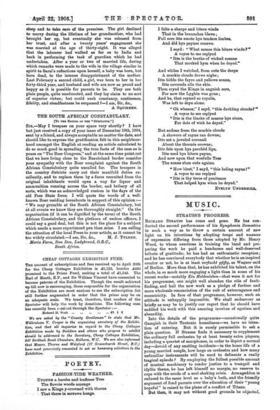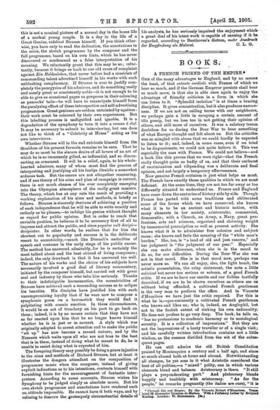STRAUSS'S PROGRESS.
RICHARD STRAUSS has come and gone. He has con. ducted the second performance of his Symphonia Domestica in such a way as to throw a certain amount of new light on his intentions by adopting tempi and nuances of expression differing from those adopted by Mr. Henry Wood, to whose exertions in training the band and pre- paring the work be paid a handsome and well-deserved tribute of gratitude; he has had an enthusiastic reception ; and he has convinced everybody that whether he is an inspired creator or not, he is at least verftucht pfiffig, as Wagner said of Berlioz. More than that, he has exhibited his talent, on the whole, in so much more engaging a light than in some of his recent works—notably Ein Helderileben—that were it not for his programme, one might well abandon the role of fault- finding, and hail the new work as a pledge of further and more wholesale renunciation of the cult of extravagance and eccentricity. In face of that programme, however, such an attitude is unhappily impossible. We shall endeavour as briefly as may be to justify our regret that he should have saddled his work with this amazing incubus of egotism and absurdity.
Into the details of the programme—occasionally gaits Gampish in their Teutonic homeliness—we have no inten- tion of entering. But it is surely permissible to ask a plain question. If Strauss finds it necessary to supplement the ordinary full orchestra by at least twenty extra players, including a quartet of saxophones, in order to depict a normal day—devoid of any exciting incidents—in the home life of a young married couple, how large an orchestra and how many unfamiliar instruments will he need to delineate a really tragical episode ? By employing the fullest possible amount of musical machinery to render justice to a tranquil and idyllic theme, he has left himself no margin, no reserve to cope with the needs of a soul-shaking crisis. Armageddon is reduced to the same level as a baby's bath, and the friendly argument of fond parents over the education of their "young hopeful" is raised to the plane of a conflict of Titans.
But then, it may not without good grounds be objected,
this is not a musical picture of a normal day in the home life of a normal young couple. It is a day in the life of a Great Genius, videlicet Strauss himself. If you think other- wise, you have only to read the dedication, the annotations in the score, the sketch programme by the composer and the full programme, based on his own hints, which he has never discovered or condemned as a false interpretation of his meaning. We reluctantly grant that this may be so ; reluc- tantly, because it brings us back to our old cause of complaint against Ein Heldenleben, that never before had a musician of commanding talent advertised himself in his works with such unblushing complacency. If Strauss is ever to justify com- pletely the panegyrics of his admirers, and do something really and sanely great or consistently noble—it is not enough to be able to give us occasional pages as gorgeous in their colouring as peacocks' tails—he will have to emancipate himself from the paralysing effect of these introspective and self -advertising programmes. Great geniuses are seldom untainted by egotism : their work must be coloured by their own experiences. But this labelling process is undignified and ignoble. It is a degradation of the symphony to turn it into a roman a clef. It may be necessary to submit to interviewing, but one does not like to think of a "Celebrity at Home" acting as his own interviewer.
Whether Strauss will in the end extricate himself from the thraldom of his present formula remains to be seen. That he may do so must be the sincere desire of all lovers of an art of which he is so immensely gifted, BO influential, and so discon- certing an ornament. It will be a relief, again, to his whole- hearted admirers, many of whom must find the process of interpreting and justifying all his lustige Streiche a somewhat arduous task. But the omens are not altogether reassuring, and if one theory of his aims and plan of campaign is correct, there is not much chance of his ever completely emerging into the Olympian atmosphere of the really great masters. The theory, which has at any rate the merit of providing a working explanation of his aims and methods, is briefly as follows. Strauss is sincerely desirous of achieving a position of such independence that he will be able to write exactly and entirely as be pleases,—to indulge his genius without thought or regard for public opinion. But in order to reach that enviable position, he believes it to be necessary first of all to impress and attract the public, and since populus salt decipi- decipiatur. In other words, he realises that for him the shortest cut to popularity and success is in the deliberate resort to eccentricity,—much like Disraeli's audacities of speech and costume in the early stage of his public career. The method has answered adrairably, for he is certainly the most talked about and the best abused of living composers ; indeed, the only drawback is that it has answered too well. The nature of his works and the choice of his subjects have necessarily involved a good deal of literary commentary, initiated by the composer himself, but carried out with great zeal and industry by those who take him seriously. Thanks to their indefatigable hermeneutics, the eccentricities of Strauss have achieved such a resounding success as to eclipse his beauties. His disciples have justified him with such uncompromising loyalty that if he were now to compose a symphonic poem on a broomstick they would find it palpitating with cosmic emotion. In these circumstances, it would be an act of treachery on his part to go back on them ; indeed, it is by no means certain that they have not so far reacted upon him that he no longer knows himself whether he is in jest or in earnest. A style which was originally adopted to arrest attention and to make the public "sit up" has now become a second nature; and by the Nemesis which waits upon all who are not true to the best that is in them, instead of doing what he meant to do, he is unable to resist doing what is expected of him.
The foregoing theory may possibly be doing a grave injustice to the aims and methods of Richard Strauss, but at least it illustrates the dangers attendant on the composition of programme music when the composer, instead of giving explicit indications as to his intentions, contents himself with furnishing hints for the encouragement of fantastic inter- preters. According to some accounts, Strauss wishes his Symphony to be judged simply as absolute music. But his own sketch programme and annotations have rendered such an attitude impossible. He cannot have it both ways, and by refusing to disavow the grotesquely circumstantial details of
his analysts, he has seriously impaired the enjoyment which a great deal of his latest work is capable of causing if it be regarded, according to Beethoven's dictum, mehr Ausdruck



































 Previous page
Previous page